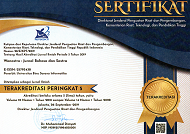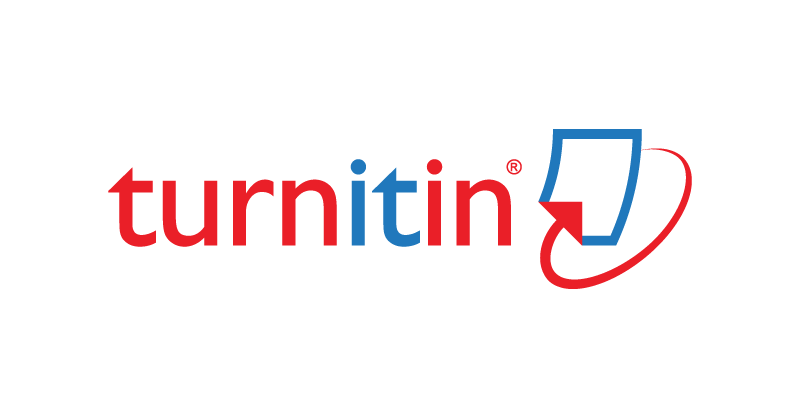Teaching Listening Through Podcast
Abstract
Full Text:
PDFReferences
Adeyomo, a sunday. (2010). Student’s Ability Level and Their Competence in problem-Solving Task in Physics. Journal Universiti of Logos, Logos, Nigeria, 36.
Al-Fahad, D. F. N. (2009). Student’s Attitudes and Perceptions Toward’s the Effectiveness of Mobile Learning in King Saud University, Saudi Arabia. The Turkish Online Journal of Educational Technology – TOJET, 8(2 Article 10), 111–119.
Amidon, E. J. (1967). The Role of the Teacher in the Classroom: A manual for understanding and improving teachers’ classroom behavior. Association for Productive Teaching.
Beare, K. (2009). Introduction to English Listening Podcast. (Online). http://esl.about.com/od/englishlistening/a/intro_podcasts.html, accessed September 18, 2020.
Brown, H. D. (2001). TEACHING by PRINCIPLES An Interactive Approach to Language Pedagogy (second). Longman.
Chang, A. C. S., & Millett, S. (2014). The effect of extensive listening on developing L2 listening fluency: Some hard evidence. ELT Journal, 68(1), 31–40. https://doi.org/10.1093/elt/cct052
Constantine, P. (2007). Podcasts: another source for listening input. The Internet TESL Journal, 13(1).
Fox, A. (2008). Using Podcasts in the EFL Classroom. Tesl-Ej, 11(4), 1–11.
Harmer, J. (2007). The Practice of English Language Teaching (Fourth Edi). Longman.
Hasan, M & Hoon, T. B. (2013). Podcast Applications in Language Learning: A Review of Recent Studies. English Language Teaching, Malaysia: Putra University, Hatch and Farhady. Research Design and Statistics For Applied Linguistics., 6(2), 128 – 135. https://doi.org/10.5539/elt.v6n2p128
Helen Mongan-Rallis & Terrie Shannon. (2006). So Many Tools So Little Time Presentation to Classrooms of the Future: Critical Reflections on Technology. Education Department, University of Minnesota Duluth, Retrieved on October 4 2012. http://www.d.umn.edu/~hrallis/professional/presentations/cotfsp06/indiv_tools/podcasting.html
Helgesen, M. (2003). Adapting and Supplementing Textbooks to Include Language Planning. Selected Papers from the Twelfth International Symposium on English Teaching and Learning.
Hornby, A. S. (2010). Oxford Advanced Learner’s Dictionary of Current English. International student’s Edition: Oxford University Press.
Jennings, D. (2006). IPods, Podcasting and Learning. Contribution Posted on the Edu Pod Blog. http://alchemi.co.uk/archives/ele/iPods_podcasting.html
Kilickaya, F. (2004). Authentic Material and Cultural Content in EFL Classroom. (Online). http://iteslj.org/Techniques/Kilickaya-AutenticMaterial.html, accessed on September 18, 2020
Lafferty, Mur & Walch, R. (2006). Tricks of the Podcasting Masters (1st ed.). Que Publishing.
Menzies, D. (2005). Duke University iPod First-Year Experience Final Evaluation Report. Duke Center for Instructional Technology, Retrieved 15th June. http://cit.duke.edu/pdf/iPod_initiative_04_05.pdf
Microsoft Corp. (2007). Windows Media Player 10.
Moody, G. (2006). Now you’re speaking my language. A businessman in China plans to deliver language learning to millions through podcasts, cutting out teachers and classrooms. The Guardian Unlimited. http://education.guardian.co.uk/tefl/teaching/story/0,,1767395,00.html.
Nunan, D. I. J. C. R. & W. A. R. (2002). Listening in language learning. Journal of Language Education and Educational Technology, 4 No. 1, 2, 238–241.
Richards, J. C. (2008). Teaching Listening and Speaking From Theory to Practice (First publ). Cambridge University Press.
Rosalinah, Y., Mulyana, D., Subroto, I., Bina, U., Informatika, S., Bina, U., Informatika, S., Bina, U., & Informatika, S. (2018). PROGRESSIVE Vol . XIII , No . 2 September 2018 TEACHING WRITING USING DICTATION METHOD OF 8th GRADE ( Field Research at SMPN 1 Pusakanagara ). XIII(2), 23–32.
Rosell-Aguilar, F. (2007). Top of the pods - In search of a podcasting “podagogy” for language learning. Computer Assisted Language Learning, 20(5), 471–492. https://doi.org/10.1080/09588220701746047
Rost, M. (2011). Teaching and researching Listening: Second edition. In Teaching and Researching Litening: Second Edition (Second Edi). Pearson Education Limited.
Sloan, S. (2005). Podcasting: An Exciting New Technology for Higher Education. Paper Presented at CATS 2005: March 25, Retrieved.
Stanley, G. (2006). Podcasting: audio on the internet comes of age. TESL-EJ 9, 4(Retrieved 15th June). http://www-writing.berkeley.edu/TESL-EJ/ej36/int.pdf
Thorne, S. L. & Payne, J. S. (2005). Evolutionary Trajectories, Internet-mediated Expression, and Language Education. CALICO JOURNAL, VOL 22, 3(7 Aug 2014), 371–397. https://doi.org/10.1558/cj.v22i3.371-397
Willingham, D. (2017). On the definition of learning.... Science & Educaiton Blog.
Wilson, S. (2008). Research is ceremony: Indigenous research methods (F. Publishing (Ed.)). Fernwood Publishing.
DOI: https://doi.org/10.31294/w.v13i2.10924
Copyright (c) 2021 Retno Rahayuningsih, Yanti Rosalinah, Ibnu Subroto

This work is licensed under a Creative Commons Attribution-ShareAlike 4.0 International License.
Index by:
Published by Department of Research and Community Service (LPPM) Universitas Bina Sarana Informatika by supported Relawan Jurnal Indonesia
Jl. Kramat Raya No.98, Kwitang, Kec. Senen, Jakarta Pusat, DKI Jakarta 10450

This work is licensed under a Creative Commons Attribution-ShareAlike 4.0 International License






